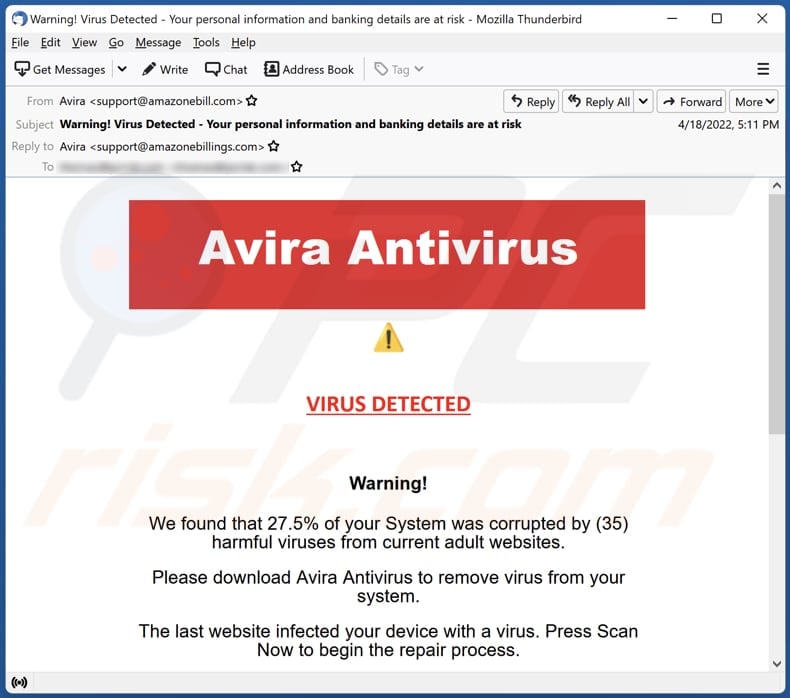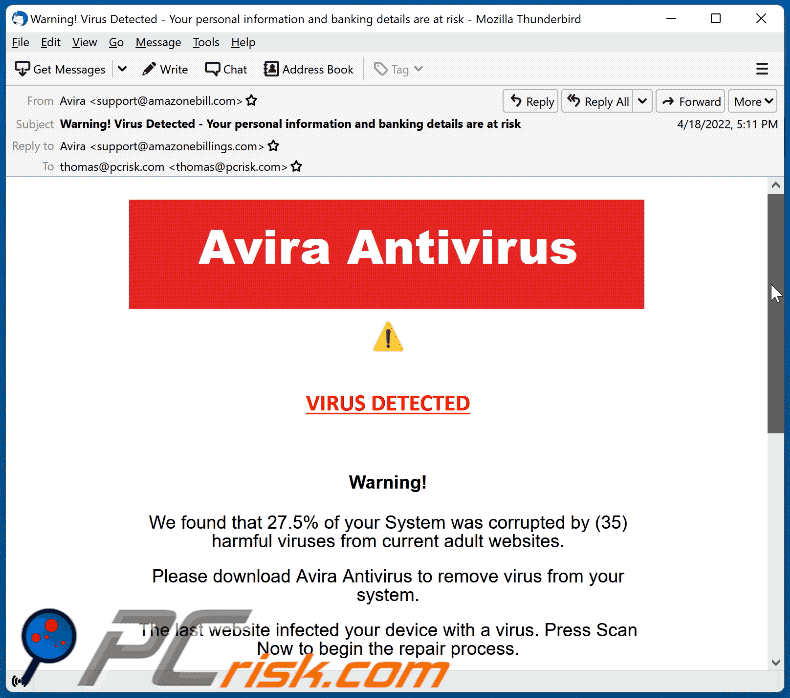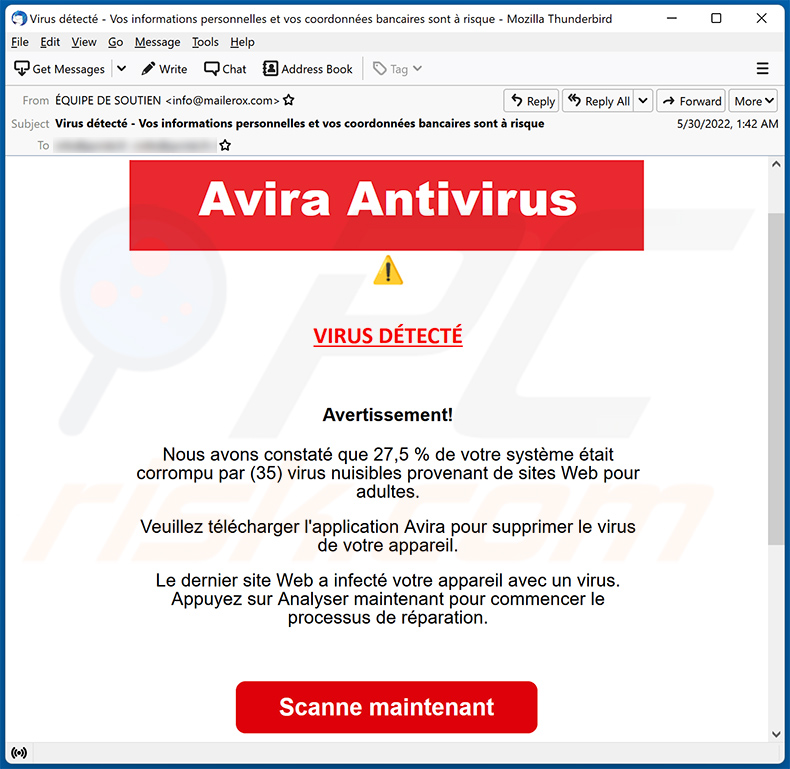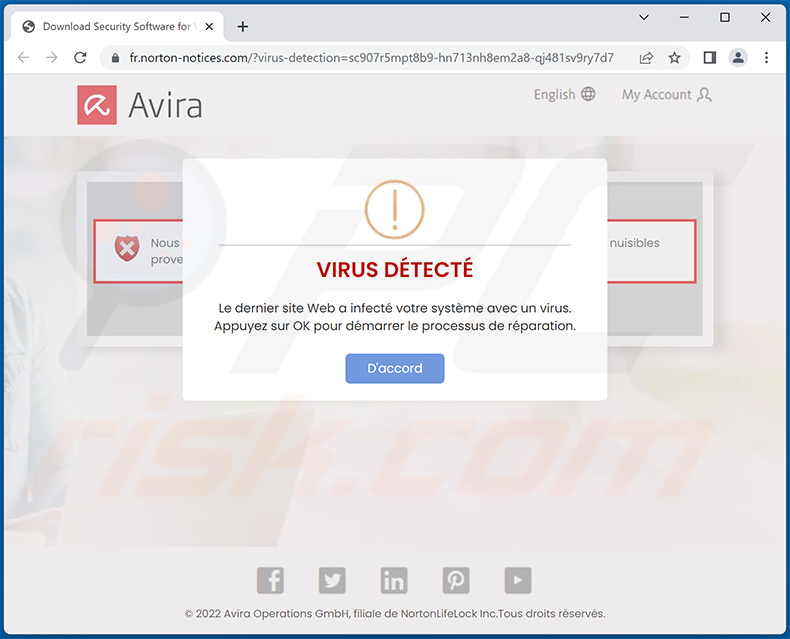How to recognize email scams like the fake email from Avira
Phishing/ScamAlso Known As: Fake email letter from Avira company
Get free scan and check if your device is infected.
Remove it nowTo use full-featured product, you have to purchase a license for Combo Cleaner. Seven days free trial available. Combo Cleaner is owned and operated by RCS LT, the parent company of PCRisk.com.
What is Avira Antivirus email scam?
We have inspected this email and concluded that it is a fake email from Avira (a legitimate computer software company). Scammers behind it attempt to trick recipients into believing that their computers are infected. Their goal is to trick them into opening a deceptive website and following the provided instructions.

More about Avira Antivirus email scam
This email claims that 35 viruses posing a threat to personal information and banking details have been detected. It encourages recipients to download Avira antivirus software to remove those viruses from the operating system.
We found that the website provided in this email (a page that the "VIRUS DETECTED" hyperlink is supposed to open) is inaccessible. It is likely that scammers use that website to trick visitors into providing sensitive information, downloading malware (or other unwanted software), or purchasing antivirus software.
When scammers use deceptive websites to promote legitimate software, their goal is to collect illegitimate commissions. No legitimate software developers use deceptive pages (or similar methods) to promote their software. This particular email scam is similar to "Avira Free Security - Your PC Is Infected With 5 Viruses!" scam.
| Name | Avira Antivirus Email Scam |
| Threat Type | Phishing, Scam, Social Engineering, Fraud |
| Fake Claim | Computer is infected with 35 viruses |
| Disguise | Letter from Avira (legitimate computer software company) |
| Symptoms | Unauthorized online purchases, changed online account passwords, identity theft, illegal access of the computer. |
| Distribution methods | Deceptive emails, rogue online pop-up ads, search engine poisoning techniques, misspelled domains. |
| Damage | Loss of sensitive private information, monetary loss, identity theft. |
| Malware Removal (Windows) |
To eliminate possible malware infections, scan your computer with legitimate antivirus software. Our security researchers recommend using Combo Cleaner. Download Combo CleanerTo use full-featured product, you have to purchase a license for Combo Cleaner. 7 days free trial available. Combo Cleaner is owned and operated by RCS LT, the parent company of PCRisk.com. |
Most email scams in general
In most cases, scammers behind emails of this kind pretend to be legitimate companies, organizations, or other entities. They seek to trick recipients into providing sensitive information or downloading malicious files. Either way, their emails cannot be trusted.
Examples of email scams are "Trezor Email Scam", "PancakeSwap Email Scam", and "We Are Closing All Mailbox Users Email Scam".
How do spam campaigns infect computers?
Emails used to deliver malware contain malicious links or attachments. In both cases, the purpose of these emails is to trick recipients into downloading and opening malicious files. Most cybercriminals use Microsoft Office or PDF documents, JavaScript files, archives like ZIP, RAR, or executable files to distribute malware.
How to avoid installation of malware?
Do not open links and attachments received from unknown email addresses. Especially when such emails are not relevant/they do not concern you. Also, download files and software from legitimate (official) pages and use direct download links. Do not use P2P networks, third-party downloaders, shady websites, etc., as sources for downloading them.
Keep the operating system and installed programs up to date. Update and activate them with tools provided by the official developers. If you've already opened malicious attachments, we recommend running a scan with Combo Cleaner Antivirus for Windows to automatically eliminate infiltrated malware.
Appearance of the Avira Antivirus email scam (GIF):

Text in this email:
Subject: Warning! Virus Detected - Your personal information and banking details are at risk
Avira Antivirus
VIRUS DETECTED
Warning!
We found that 27.5% of your System was corrupted by (35) harmful viruses from current adult websites.
Please download Avira Antivirus to remove virus from your system.
The last website infected your device with a virus. Press Scan Now to begin the repair process.
Scan now
We have put together a limited offer especially for you.
E-mail : -
Discount : (40%) today only.© 2022 Avira Operations GmbH, part of NortonLifeLock Inc. All rights reserved.
Unsubscribe
French variant of Avira Antivirus email scam used to promote a phishing site:

Text presented within:
Subject: Virus détecté - Vos informations personnelles et vos coordonnées bancaires sont à risque
Avira Antivirus
VIRUS DÉTECTÉ
Avertissement!Nous avons constaté que 27,5 % de votre système était corrompu par (35) virus nuisibles provenant de sites Web pour adultes.
Veuillez télécharger l'application Avira pour supprimer le virus de votre appareil.
Le dernier site Web a infecté votre appareil avec un virus. Appuyez sur Analyser maintenant pour commencer le processus de réparation.
Scanne maintenant
Nous avons élaboré une offre limitée spécialement pour vous.
E-mail : -
Les rabais : (40%) aujourd'hui seulement .
© 2022 Avira Operations GmbH, filiale de Norton LifeLock Inc. Tous droits réservés.
se désabonner
Screenshot of the promoted phishing site:

Instant automatic malware removal:
Manual threat removal might be a lengthy and complicated process that requires advanced IT skills. Combo Cleaner is a professional automatic malware removal tool that is recommended to get rid of malware. Download it by clicking the button below:
DOWNLOAD Combo CleanerBy downloading any software listed on this website you agree to our Privacy Policy and Terms of Use. To use full-featured product, you have to purchase a license for Combo Cleaner. 7 days free trial available. Combo Cleaner is owned and operated by RCS LT, the parent company of PCRisk.com.
Quick menu:
- What is Fake email letter from Avira company?
- Types of malicious emails.
- How to spot a malicious email?
- What to do if you fell for an email scam?
Types of malicious emails:
![]() Phishing Emails
Phishing Emails
Most commonly, cybercriminals use deceptive emails to trick Internet users into giving away their sensitive private information, for example, login information for various online services, email accounts, or online banking information.
Such attacks are called phishing. In a phishing attack, cybercriminals usually send an email message with some popular service logo (for example, Microsoft, DHL, Amazon, Netflix), create urgency (wrong shipping address, expired password, etc.), and place a link which they hope their potential victims will click on.
After clicking the link presented in such email message, victims are redirected to a fake website that looks identical or extremely similar to the original one. Victims are then asked to enter their password, credit card details, or some other information that gets stolen by cybercriminals.
![]() Emails with Malicious Attachments
Emails with Malicious Attachments
Another popular attack vector is email spam with malicious attachments that infect users' computers with malware. Malicious attachments usually carry trojans that are capable of stealing passwords, banking information, and other sensitive information.
In such attacks, cybercriminals' main goal is to trick their potential victims into opening an infected email attachment. To achieve this goal, email messages usually talk about recently received invoices, faxes, or voice messages.
If a potential victim falls for the lure and opens the attachment, their computers get infected, and cybercriminals can collect a lot of sensitive information.
While it's a more complicated method to steal personal information (spam filters and antivirus programs usually detect such attempts), if successful, cybercriminals can get a much wider array of data and can collect information for a long period of time.
![]() Sextortion Emails
Sextortion Emails
This is a type of phishing. In this case, users receive an email claiming that a cybercriminal could access the webcam of the potential victim and has a video recording of one's masturbation.
To get rid of the video, victims are asked to pay a ransom (usually using Bitcoin or another cryptocurrency). Nevertheless, all of these claims are false - users who receive such emails should ignore and delete them.
How to spot a malicious email?
While cyber criminals try to make their lure emails look trustworthy, here are some things that you should look for when trying to spot a phishing email:
- Check the sender's ("from") email address: Hover your mouse over the "from" address and check if it's legitimate. For example, if you received an email from Microsoft, be sure to check if the email address is @microsoft.com and not something suspicious like @m1crosoft.com, @microsfot.com, @account-security-noreply.com, etc.
- Check for generic greetings: If the greeting in the email is "Dear user", "Dear @youremail.com", "Dear valued customer", this should raise suspiciousness. Most commonly, companies call you by your name. Lack of this information could signal a phishing attempt.
- Check the links in the email: Hover your mouse over the link presented in the email, if the link that appears seems suspicious, don't click it. For example, if you received an email from Microsoft and the link in the email shows that it will go to firebasestorage.googleapis.com/v0... you shouldn't trust it. It's best not to click any links in the emails but to visit the company website that sent you the email in the first place.
- Don't blindly trust email attachments: Most commonly, legitimate companies will ask you to log in to their website and to view any documents there; if you received an email with an attachment, it's a good idea to scan it with an antivirus application. Infected email attachments are a common attack vector used by cybercriminals.
To minimise the risk of opening phishing and malicious emails we recommend using Combo Cleaner Antivirus for Windows.
Example of a spam email:

What to do if you fell for an email scam?
- If you clicked on a link in a phishing email and entered your password - be sure to change your password as soon as possible. Usually, cybercriminals collect stolen credentials and then sell them to other groups that use them for malicious purposes. If you change your password in a timely manner, there's a chance that criminals won't have enough time to do any damage.
- If you entered your credit card information - contact your bank as soon as possible and explain the situation. There's a good chance that you will need to cancel your compromised credit card and get a new one.
- If you see any signs of identity theft - you should immediately contact the Federal Trade Commission. This institution will collect information about your situation and create a personal recovery plan.
- If you opened a malicious attachment - your computer is probably infected, you should scan it with a reputable antivirus application. For this purpose, we recommend using Combo Cleaner Antivirus for Windows.
- Help other Internet users - report phishing emails to Anti-Phishing Working Group, FBI’s Internet Crime Complaint Center, National Fraud Information Center and U.S. Department of Justice.
Frequently Asked Questions (FAQ)
Why did I receive this email?
There is a high chance that many other people also have received this email. Typically, emails like this one are not personal. Scammers send the same email to all recipients.
I have provided my personal information when tricked by this email, what should I do?
If you have provided account credentials (like username, email address, password), change all passwords as soon as possible. In other cases (if you have provided credit card details, ID card information, etc.), contact the corresponding authorities.
I have downloaded and opened a file attached to an email used to deliver malware, is my computer infected?
It depends on the file type. For example, malicious MS Office documents cannot infect computers unless users open them and enable macros commands. However, malicious executables inject malware once they are opened.
I have read a malicious email but didn't open the attachment, is my computer infected?
No, opening an email by itself is completely harmless.
Will Combo Cleaner remove malware infections that were present in email attachment?
Yes, Combo Cleaner will scan your computer and remove detected malware (it can detect almost all known malware). If your computer is infected with high-end malware, run a full system scan. Otherwise, the antivirus software will not detect malware that hides deep in the operating system.
Share:

Tomas Meskauskas
Expert security researcher, professional malware analyst
I am passionate about computer security and technology. I have an experience of over 10 years working in various companies related to computer technical issue solving and Internet security. I have been working as an author and editor for pcrisk.com since 2010. Follow me on Twitter and LinkedIn to stay informed about the latest online security threats.
PCrisk security portal is brought by a company RCS LT.
Joined forces of security researchers help educate computer users about the latest online security threats. More information about the company RCS LT.
Our malware removal guides are free. However, if you want to support us you can send us a donation.
DonatePCrisk security portal is brought by a company RCS LT.
Joined forces of security researchers help educate computer users about the latest online security threats. More information about the company RCS LT.
Our malware removal guides are free. However, if you want to support us you can send us a donation.
Donate
▼ Show Discussion